Developing Skills as an International Business Manager - Report
VerifiedAdded on 2022/12/02
|8
|1959
|350
Report
AI Summary
This report provides an in-depth analysis of the essential skills required for an international business manager in today's globalized business environment. The report highlights the significance of cross-cultural communication and the ability to effectively manage multicultural teams. It emphasizes the importance of understanding and adapting to diverse cultural backgrounds, referencing Hofstede's cultural dimension theory to illustrate how cultural values influence communication styles and management approaches. The author, drawing upon personal experience, discusses the challenges and strategies involved in managing teams with diverse cultural backgrounds, particularly focusing on communication dynamics and the application of motivational techniques to enhance team performance. The report concludes by summarizing the key skills and capabilities needed for international business managers, emphasizing the necessity of individual management strategies to foster effective multicultural team dynamics.
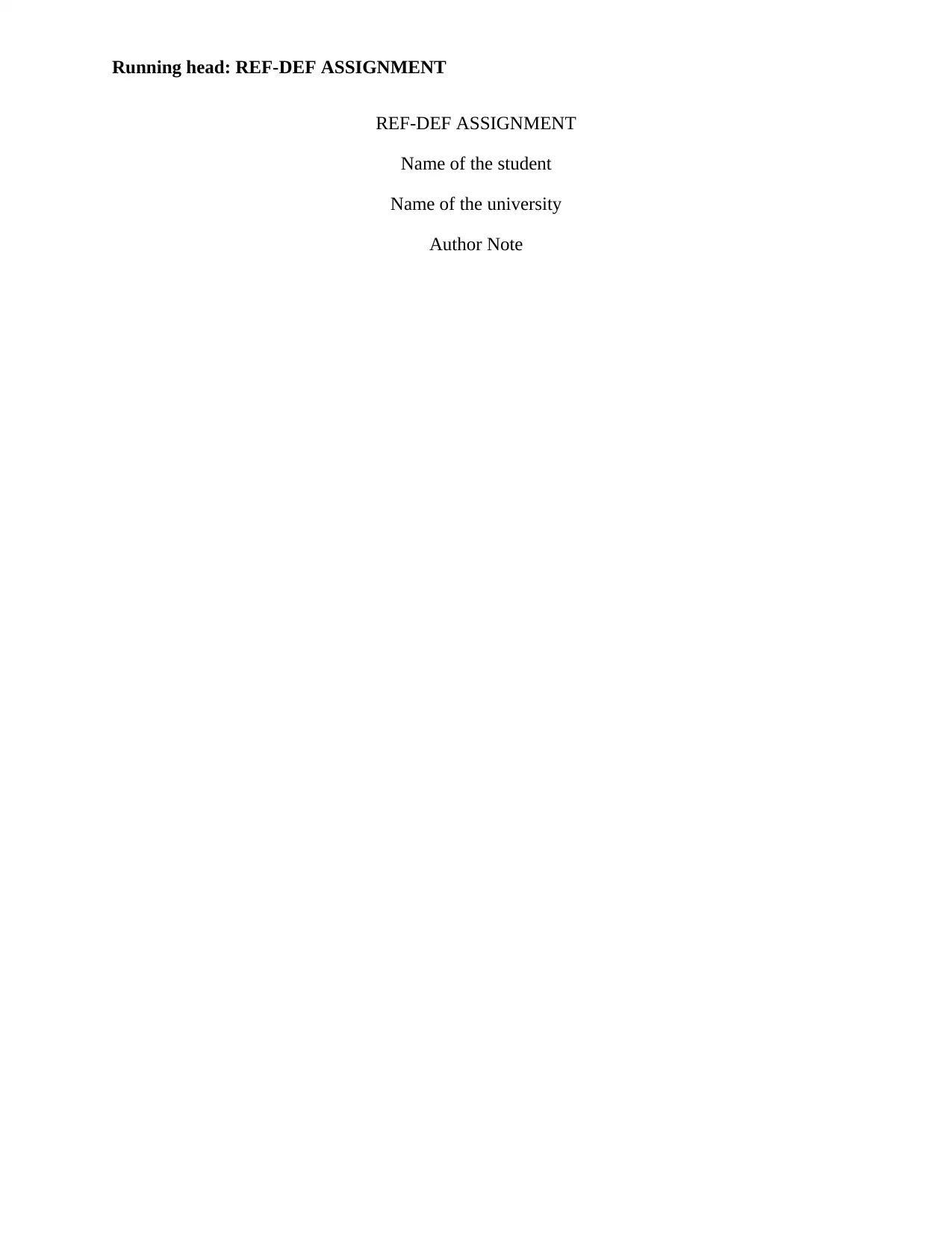
Running head: REF-DEF ASSIGNMENT
REF-DEF ASSIGNMENT
Name of the student
Name of the university
Author Note
REF-DEF ASSIGNMENT
Name of the student
Name of the university
Author Note
Paraphrase This Document
Need a fresh take? Get an instant paraphrase of this document with our AI Paraphraser
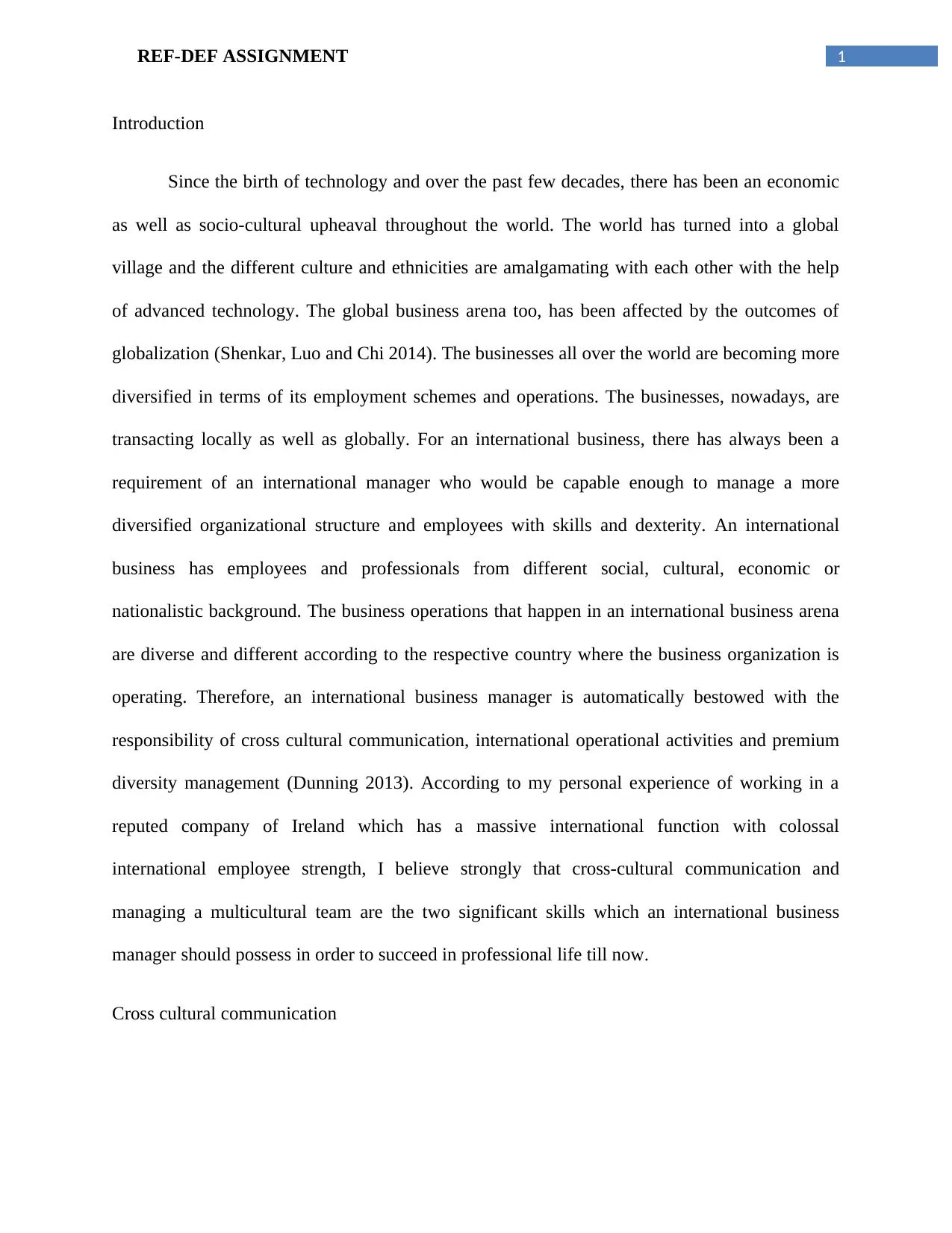
1REF-DEF ASSIGNMENT
Introduction
Since the birth of technology and over the past few decades, there has been an economic
as well as socio-cultural upheaval throughout the world. The world has turned into a global
village and the different culture and ethnicities are amalgamating with each other with the help
of advanced technology. The global business arena too, has been affected by the outcomes of
globalization (Shenkar, Luo and Chi 2014). The businesses all over the world are becoming more
diversified in terms of its employment schemes and operations. The businesses, nowadays, are
transacting locally as well as globally. For an international business, there has always been a
requirement of an international manager who would be capable enough to manage a more
diversified organizational structure and employees with skills and dexterity. An international
business has employees and professionals from different social, cultural, economic or
nationalistic background. The business operations that happen in an international business arena
are diverse and different according to the respective country where the business organization is
operating. Therefore, an international business manager is automatically bestowed with the
responsibility of cross cultural communication, international operational activities and premium
diversity management (Dunning 2013). According to my personal experience of working in a
reputed company of Ireland which has a massive international function with colossal
international employee strength, I believe strongly that cross-cultural communication and
managing a multicultural team are the two significant skills which an international business
manager should possess in order to succeed in professional life till now.
Cross cultural communication
Introduction
Since the birth of technology and over the past few decades, there has been an economic
as well as socio-cultural upheaval throughout the world. The world has turned into a global
village and the different culture and ethnicities are amalgamating with each other with the help
of advanced technology. The global business arena too, has been affected by the outcomes of
globalization (Shenkar, Luo and Chi 2014). The businesses all over the world are becoming more
diversified in terms of its employment schemes and operations. The businesses, nowadays, are
transacting locally as well as globally. For an international business, there has always been a
requirement of an international manager who would be capable enough to manage a more
diversified organizational structure and employees with skills and dexterity. An international
business has employees and professionals from different social, cultural, economic or
nationalistic background. The business operations that happen in an international business arena
are diverse and different according to the respective country where the business organization is
operating. Therefore, an international business manager is automatically bestowed with the
responsibility of cross cultural communication, international operational activities and premium
diversity management (Dunning 2013). According to my personal experience of working in a
reputed company of Ireland which has a massive international function with colossal
international employee strength, I believe strongly that cross-cultural communication and
managing a multicultural team are the two significant skills which an international business
manager should possess in order to succeed in professional life till now.
Cross cultural communication
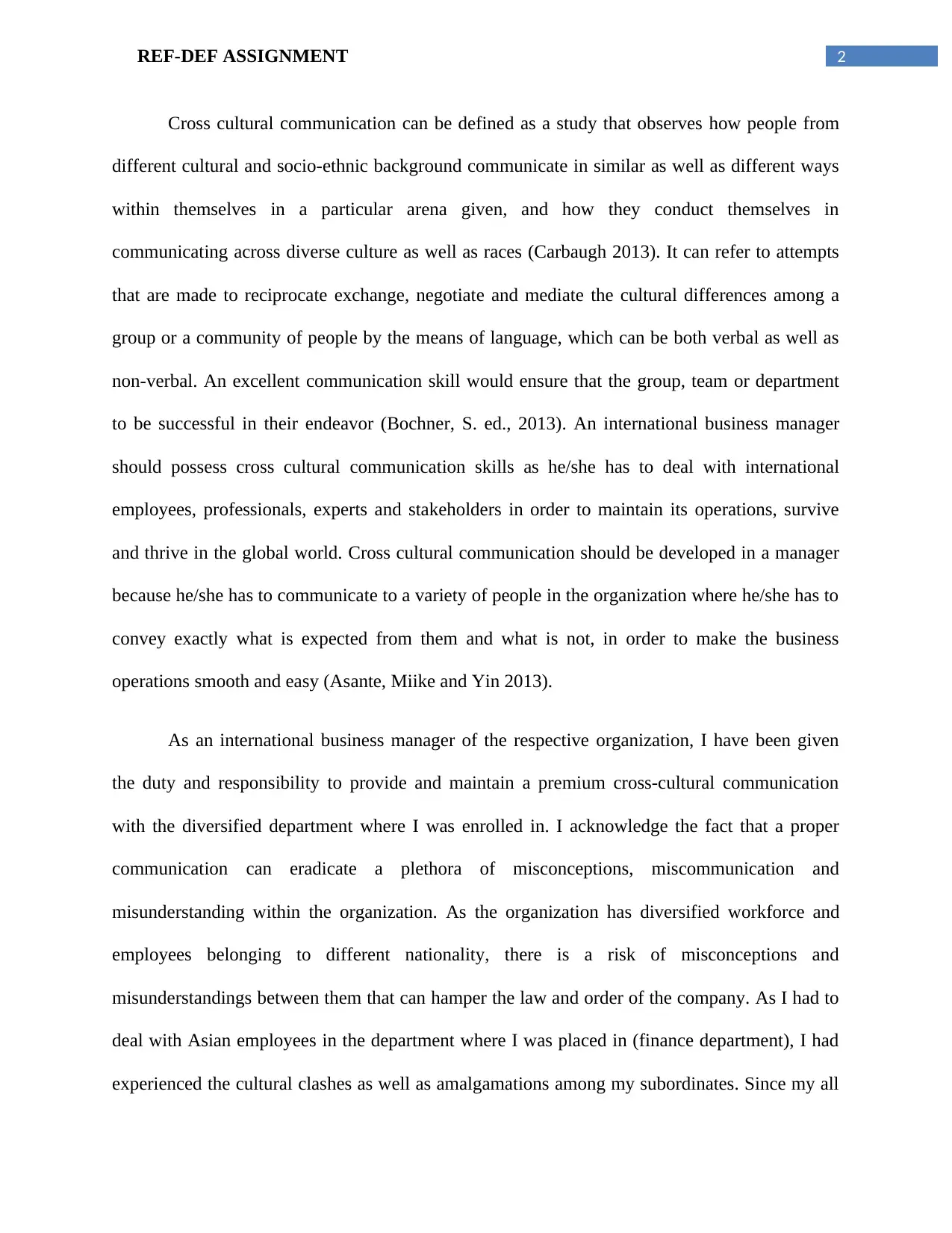
2REF-DEF ASSIGNMENT
Cross cultural communication can be defined as a study that observes how people from
different cultural and socio-ethnic background communicate in similar as well as different ways
within themselves in a particular arena given, and how they conduct themselves in
communicating across diverse culture as well as races (Carbaugh 2013). It can refer to attempts
that are made to reciprocate exchange, negotiate and mediate the cultural differences among a
group or a community of people by the means of language, which can be both verbal as well as
non-verbal. An excellent communication skill would ensure that the group, team or department
to be successful in their endeavor (Bochner, S. ed., 2013). An international business manager
should possess cross cultural communication skills as he/she has to deal with international
employees, professionals, experts and stakeholders in order to maintain its operations, survive
and thrive in the global world. Cross cultural communication should be developed in a manager
because he/she has to communicate to a variety of people in the organization where he/she has to
convey exactly what is expected from them and what is not, in order to make the business
operations smooth and easy (Asante, Miike and Yin 2013).
As an international business manager of the respective organization, I have been given
the duty and responsibility to provide and maintain a premium cross-cultural communication
with the diversified department where I was enrolled in. I acknowledge the fact that a proper
communication can eradicate a plethora of misconceptions, miscommunication and
misunderstanding within the organization. As the organization has diversified workforce and
employees belonging to different nationality, there is a risk of misconceptions and
misunderstandings between them that can hamper the law and order of the company. As I had to
deal with Asian employees in the department where I was placed in (finance department), I had
experienced the cultural clashes as well as amalgamations among my subordinates. Since my all
Cross cultural communication can be defined as a study that observes how people from
different cultural and socio-ethnic background communicate in similar as well as different ways
within themselves in a particular arena given, and how they conduct themselves in
communicating across diverse culture as well as races (Carbaugh 2013). It can refer to attempts
that are made to reciprocate exchange, negotiate and mediate the cultural differences among a
group or a community of people by the means of language, which can be both verbal as well as
non-verbal. An excellent communication skill would ensure that the group, team or department
to be successful in their endeavor (Bochner, S. ed., 2013). An international business manager
should possess cross cultural communication skills as he/she has to deal with international
employees, professionals, experts and stakeholders in order to maintain its operations, survive
and thrive in the global world. Cross cultural communication should be developed in a manager
because he/she has to communicate to a variety of people in the organization where he/she has to
convey exactly what is expected from them and what is not, in order to make the business
operations smooth and easy (Asante, Miike and Yin 2013).
As an international business manager of the respective organization, I have been given
the duty and responsibility to provide and maintain a premium cross-cultural communication
with the diversified department where I was enrolled in. I acknowledge the fact that a proper
communication can eradicate a plethora of misconceptions, miscommunication and
misunderstanding within the organization. As the organization has diversified workforce and
employees belonging to different nationality, there is a risk of misconceptions and
misunderstandings between them that can hamper the law and order of the company. As I had to
deal with Asian employees in the department where I was placed in (finance department), I had
experienced the cultural clashes as well as amalgamations among my subordinates. Since my all
⊘ This is a preview!⊘
Do you want full access?
Subscribe today to unlock all pages.

Trusted by 1+ million students worldwide
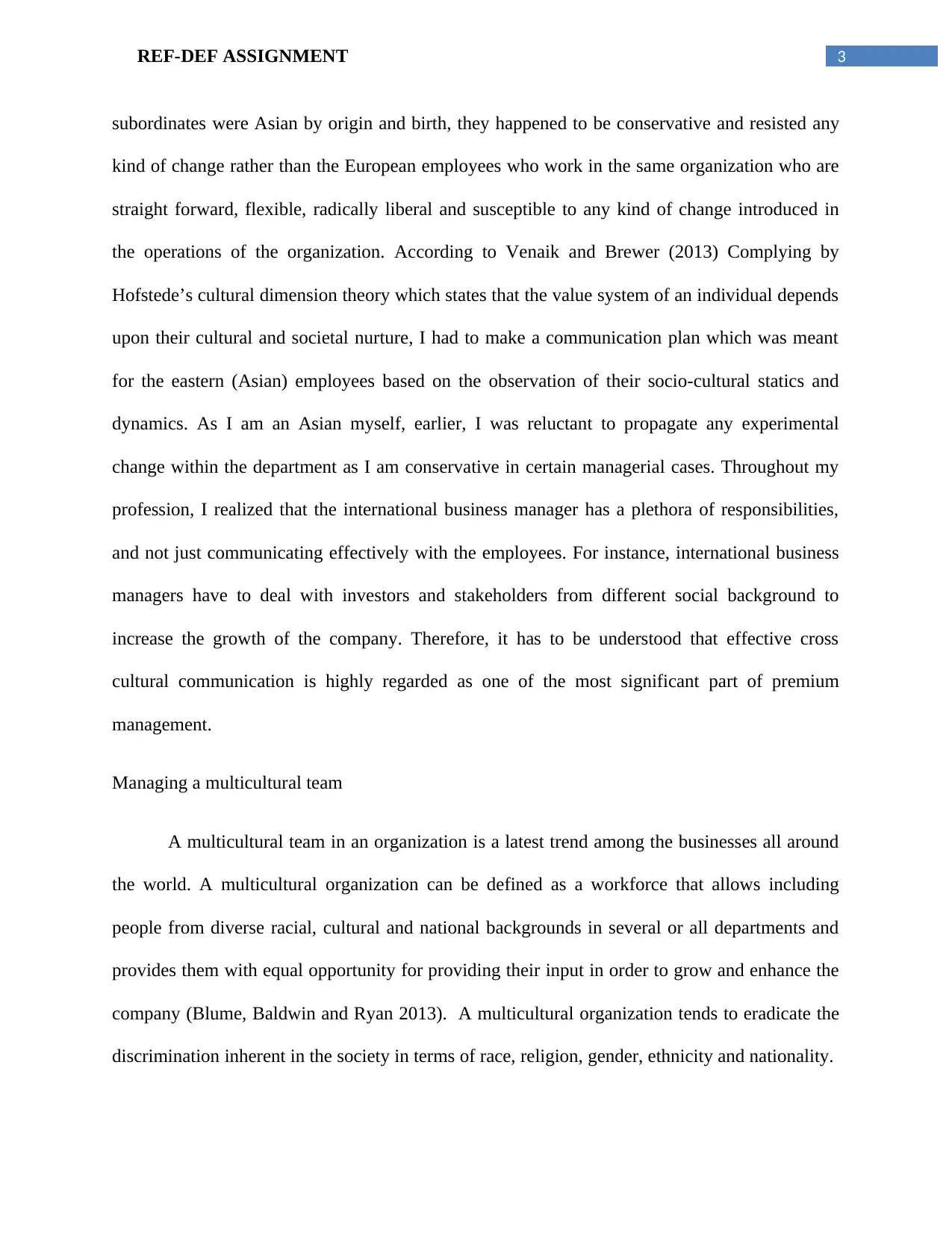
3REF-DEF ASSIGNMENT
subordinates were Asian by origin and birth, they happened to be conservative and resisted any
kind of change rather than the European employees who work in the same organization who are
straight forward, flexible, radically liberal and susceptible to any kind of change introduced in
the operations of the organization. According to Venaik and Brewer (2013) Complying by
Hofstede’s cultural dimension theory which states that the value system of an individual depends
upon their cultural and societal nurture, I had to make a communication plan which was meant
for the eastern (Asian) employees based on the observation of their socio-cultural statics and
dynamics. As I am an Asian myself, earlier, I was reluctant to propagate any experimental
change within the department as I am conservative in certain managerial cases. Throughout my
profession, I realized that the international business manager has a plethora of responsibilities,
and not just communicating effectively with the employees. For instance, international business
managers have to deal with investors and stakeholders from different social background to
increase the growth of the company. Therefore, it has to be understood that effective cross
cultural communication is highly regarded as one of the most significant part of premium
management.
Managing a multicultural team
A multicultural team in an organization is a latest trend among the businesses all around
the world. A multicultural organization can be defined as a workforce that allows including
people from diverse racial, cultural and national backgrounds in several or all departments and
provides them with equal opportunity for providing their input in order to grow and enhance the
company (Blume, Baldwin and Ryan 2013). A multicultural organization tends to eradicate the
discrimination inherent in the society in terms of race, religion, gender, ethnicity and nationality.
subordinates were Asian by origin and birth, they happened to be conservative and resisted any
kind of change rather than the European employees who work in the same organization who are
straight forward, flexible, radically liberal and susceptible to any kind of change introduced in
the operations of the organization. According to Venaik and Brewer (2013) Complying by
Hofstede’s cultural dimension theory which states that the value system of an individual depends
upon their cultural and societal nurture, I had to make a communication plan which was meant
for the eastern (Asian) employees based on the observation of their socio-cultural statics and
dynamics. As I am an Asian myself, earlier, I was reluctant to propagate any experimental
change within the department as I am conservative in certain managerial cases. Throughout my
profession, I realized that the international business manager has a plethora of responsibilities,
and not just communicating effectively with the employees. For instance, international business
managers have to deal with investors and stakeholders from different social background to
increase the growth of the company. Therefore, it has to be understood that effective cross
cultural communication is highly regarded as one of the most significant part of premium
management.
Managing a multicultural team
A multicultural team in an organization is a latest trend among the businesses all around
the world. A multicultural organization can be defined as a workforce that allows including
people from diverse racial, cultural and national backgrounds in several or all departments and
provides them with equal opportunity for providing their input in order to grow and enhance the
company (Blume, Baldwin and Ryan 2013). A multicultural organization tends to eradicate the
discrimination inherent in the society in terms of race, religion, gender, ethnicity and nationality.
Paraphrase This Document
Need a fresh take? Get an instant paraphrase of this document with our AI Paraphraser
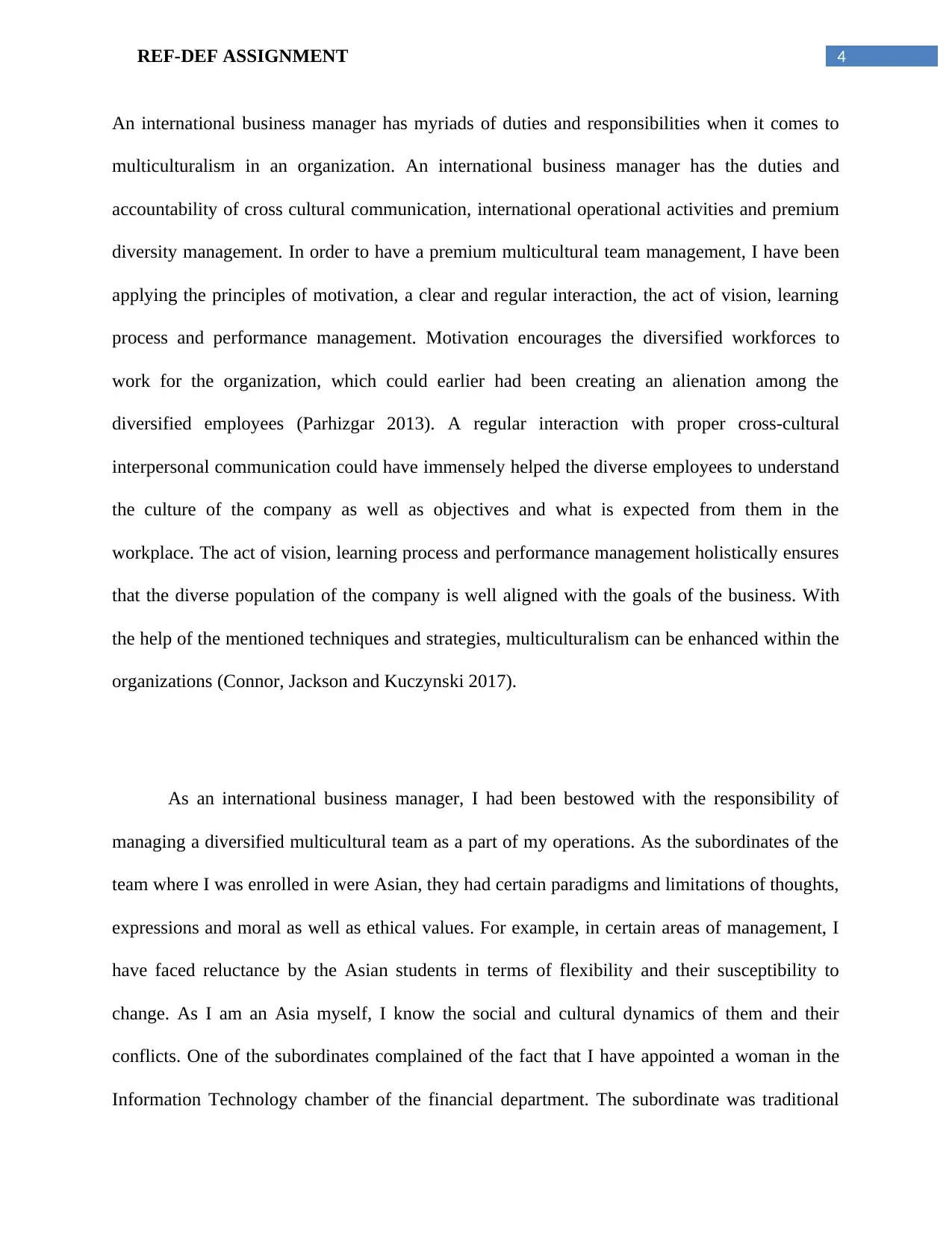
4REF-DEF ASSIGNMENT
An international business manager has myriads of duties and responsibilities when it comes to
multiculturalism in an organization. An international business manager has the duties and
accountability of cross cultural communication, international operational activities and premium
diversity management. In order to have a premium multicultural team management, I have been
applying the principles of motivation, a clear and regular interaction, the act of vision, learning
process and performance management. Motivation encourages the diversified workforces to
work for the organization, which could earlier had been creating an alienation among the
diversified employees (Parhizgar 2013). A regular interaction with proper cross-cultural
interpersonal communication could have immensely helped the diverse employees to understand
the culture of the company as well as objectives and what is expected from them in the
workplace. The act of vision, learning process and performance management holistically ensures
that the diverse population of the company is well aligned with the goals of the business. With
the help of the mentioned techniques and strategies, multiculturalism can be enhanced within the
organizations (Connor, Jackson and Kuczynski 2017).
As an international business manager, I had been bestowed with the responsibility of
managing a diversified multicultural team as a part of my operations. As the subordinates of the
team where I was enrolled in were Asian, they had certain paradigms and limitations of thoughts,
expressions and moral as well as ethical values. For example, in certain areas of management, I
have faced reluctance by the Asian students in terms of flexibility and their susceptibility to
change. As I am an Asia myself, I know the social and cultural dynamics of them and their
conflicts. One of the subordinates complained of the fact that I have appointed a woman in the
Information Technology chamber of the financial department. The subordinate was traditional
An international business manager has myriads of duties and responsibilities when it comes to
multiculturalism in an organization. An international business manager has the duties and
accountability of cross cultural communication, international operational activities and premium
diversity management. In order to have a premium multicultural team management, I have been
applying the principles of motivation, a clear and regular interaction, the act of vision, learning
process and performance management. Motivation encourages the diversified workforces to
work for the organization, which could earlier had been creating an alienation among the
diversified employees (Parhizgar 2013). A regular interaction with proper cross-cultural
interpersonal communication could have immensely helped the diverse employees to understand
the culture of the company as well as objectives and what is expected from them in the
workplace. The act of vision, learning process and performance management holistically ensures
that the diverse population of the company is well aligned with the goals of the business. With
the help of the mentioned techniques and strategies, multiculturalism can be enhanced within the
organizations (Connor, Jackson and Kuczynski 2017).
As an international business manager, I had been bestowed with the responsibility of
managing a diversified multicultural team as a part of my operations. As the subordinates of the
team where I was enrolled in were Asian, they had certain paradigms and limitations of thoughts,
expressions and moral as well as ethical values. For example, in certain areas of management, I
have faced reluctance by the Asian students in terms of flexibility and their susceptibility to
change. As I am an Asia myself, I know the social and cultural dynamics of them and their
conflicts. One of the subordinates complained of the fact that I have appointed a woman in the
Information Technology chamber of the financial department. The subordinate was traditional
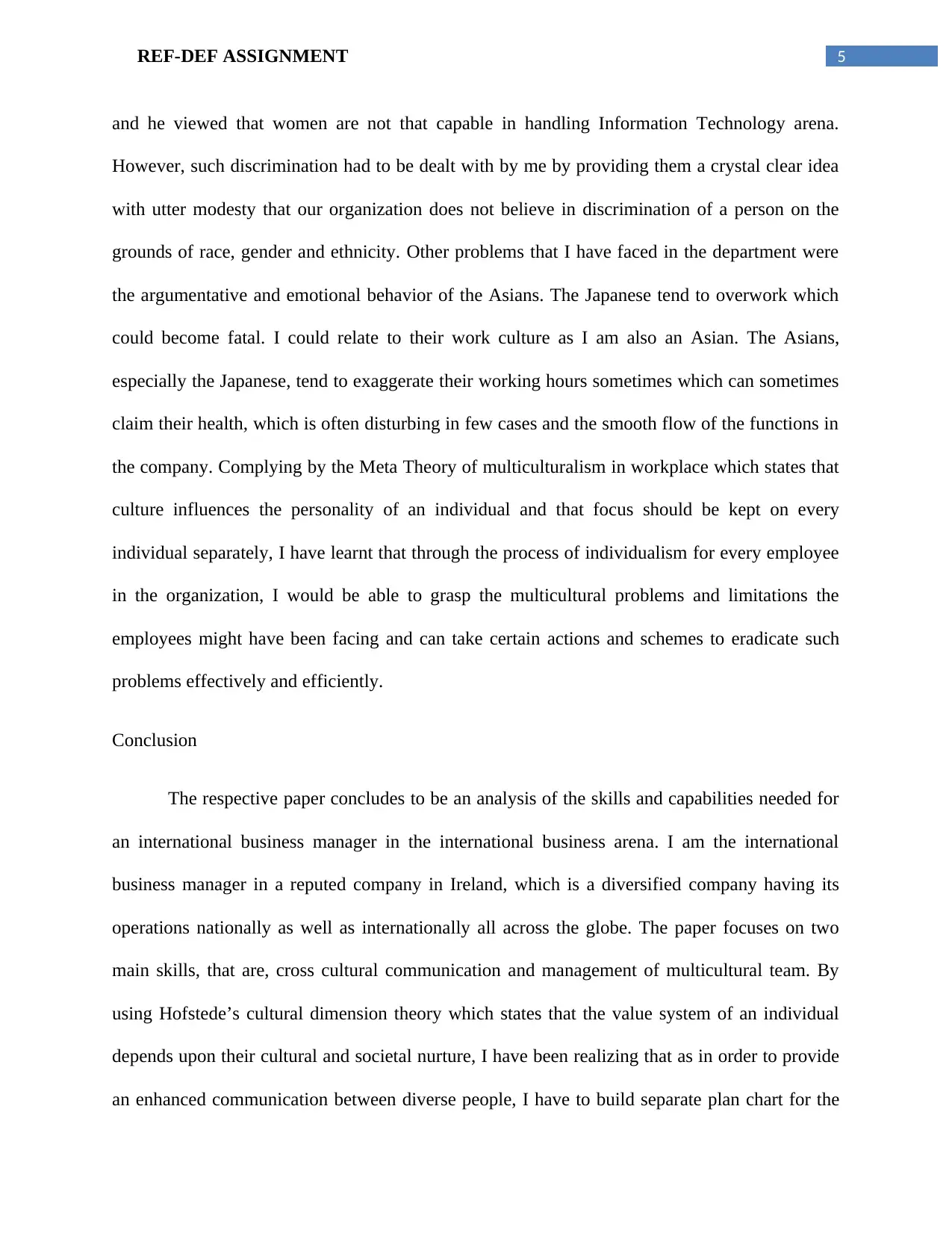
5REF-DEF ASSIGNMENT
and he viewed that women are not that capable in handling Information Technology arena.
However, such discrimination had to be dealt with by me by providing them a crystal clear idea
with utter modesty that our organization does not believe in discrimination of a person on the
grounds of race, gender and ethnicity. Other problems that I have faced in the department were
the argumentative and emotional behavior of the Asians. The Japanese tend to overwork which
could become fatal. I could relate to their work culture as I am also an Asian. The Asians,
especially the Japanese, tend to exaggerate their working hours sometimes which can sometimes
claim their health, which is often disturbing in few cases and the smooth flow of the functions in
the company. Complying by the Meta Theory of multiculturalism in workplace which states that
culture influences the personality of an individual and that focus should be kept on every
individual separately, I have learnt that through the process of individualism for every employee
in the organization, I would be able to grasp the multicultural problems and limitations the
employees might have been facing and can take certain actions and schemes to eradicate such
problems effectively and efficiently.
Conclusion
The respective paper concludes to be an analysis of the skills and capabilities needed for
an international business manager in the international business arena. I am the international
business manager in a reputed company in Ireland, which is a diversified company having its
operations nationally as well as internationally all across the globe. The paper focuses on two
main skills, that are, cross cultural communication and management of multicultural team. By
using Hofstede’s cultural dimension theory which states that the value system of an individual
depends upon their cultural and societal nurture, I have been realizing that as in order to provide
an enhanced communication between diverse people, I have to build separate plan chart for the
and he viewed that women are not that capable in handling Information Technology arena.
However, such discrimination had to be dealt with by me by providing them a crystal clear idea
with utter modesty that our organization does not believe in discrimination of a person on the
grounds of race, gender and ethnicity. Other problems that I have faced in the department were
the argumentative and emotional behavior of the Asians. The Japanese tend to overwork which
could become fatal. I could relate to their work culture as I am also an Asian. The Asians,
especially the Japanese, tend to exaggerate their working hours sometimes which can sometimes
claim their health, which is often disturbing in few cases and the smooth flow of the functions in
the company. Complying by the Meta Theory of multiculturalism in workplace which states that
culture influences the personality of an individual and that focus should be kept on every
individual separately, I have learnt that through the process of individualism for every employee
in the organization, I would be able to grasp the multicultural problems and limitations the
employees might have been facing and can take certain actions and schemes to eradicate such
problems effectively and efficiently.
Conclusion
The respective paper concludes to be an analysis of the skills and capabilities needed for
an international business manager in the international business arena. I am the international
business manager in a reputed company in Ireland, which is a diversified company having its
operations nationally as well as internationally all across the globe. The paper focuses on two
main skills, that are, cross cultural communication and management of multicultural team. By
using Hofstede’s cultural dimension theory which states that the value system of an individual
depends upon their cultural and societal nurture, I have been realizing that as in order to provide
an enhanced communication between diverse people, I have to build separate plan chart for the
⊘ This is a preview!⊘
Do you want full access?
Subscribe today to unlock all pages.

Trusted by 1+ million students worldwide
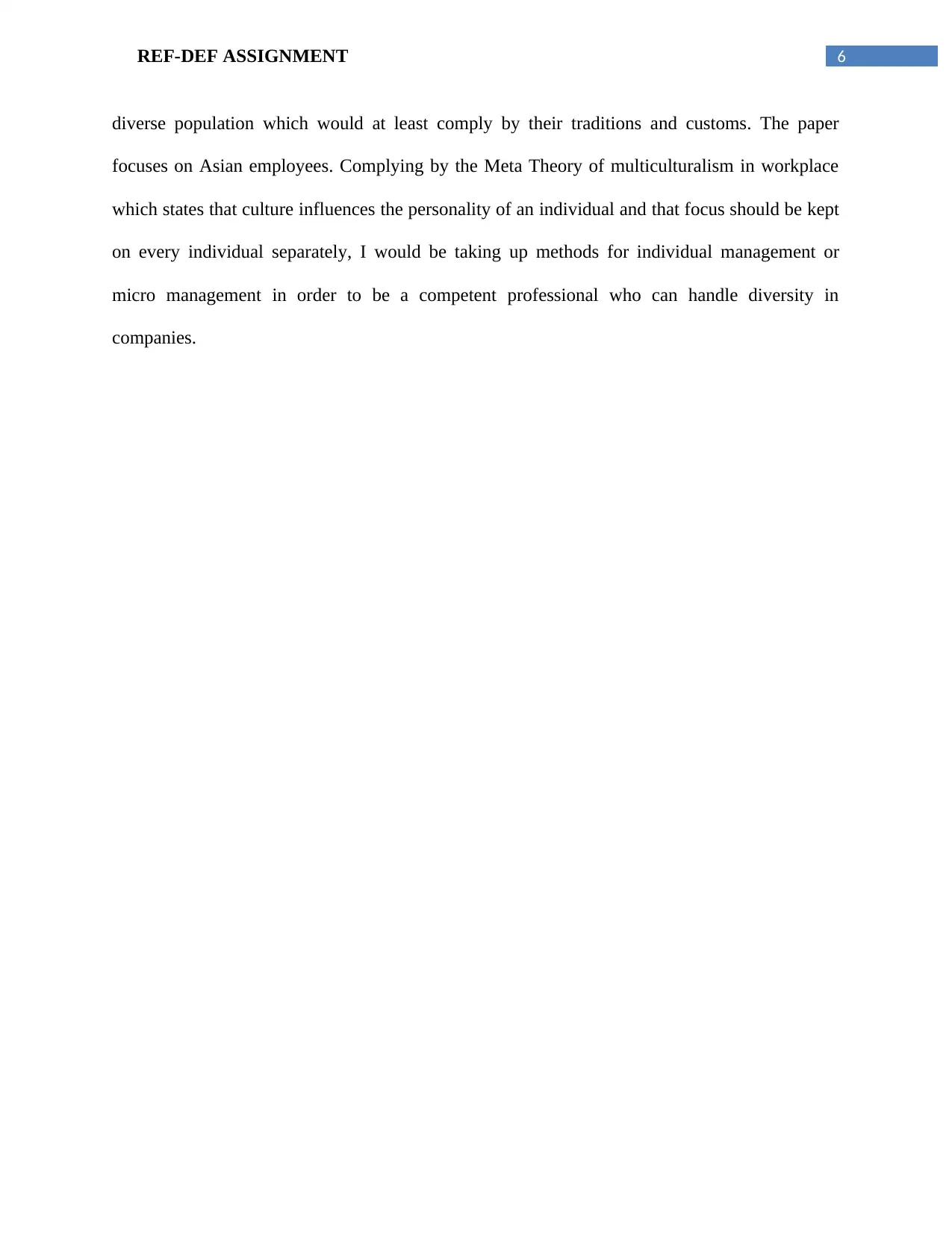
6REF-DEF ASSIGNMENT
diverse population which would at least comply by their traditions and customs. The paper
focuses on Asian employees. Complying by the Meta Theory of multiculturalism in workplace
which states that culture influences the personality of an individual and that focus should be kept
on every individual separately, I would be taking up methods for individual management or
micro management in order to be a competent professional who can handle diversity in
companies.
diverse population which would at least comply by their traditions and customs. The paper
focuses on Asian employees. Complying by the Meta Theory of multiculturalism in workplace
which states that culture influences the personality of an individual and that focus should be kept
on every individual separately, I would be taking up methods for individual management or
micro management in order to be a competent professional who can handle diversity in
companies.
Paraphrase This Document
Need a fresh take? Get an instant paraphrase of this document with our AI Paraphraser
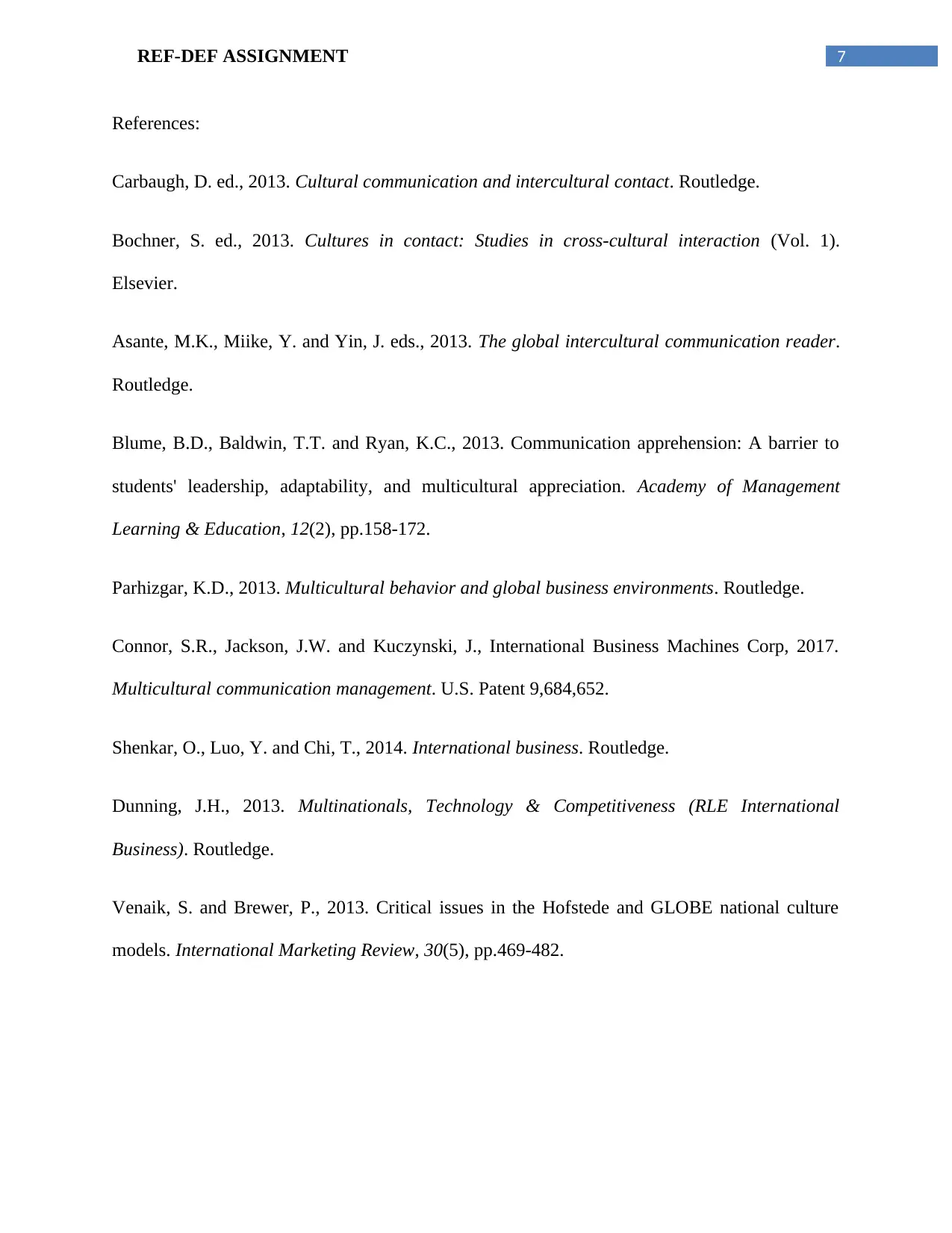
7REF-DEF ASSIGNMENT
References:
Carbaugh, D. ed., 2013. Cultural communication and intercultural contact. Routledge.
Bochner, S. ed., 2013. Cultures in contact: Studies in cross-cultural interaction (Vol. 1).
Elsevier.
Asante, M.K., Miike, Y. and Yin, J. eds., 2013. The global intercultural communication reader.
Routledge.
Blume, B.D., Baldwin, T.T. and Ryan, K.C., 2013. Communication apprehension: A barrier to
students' leadership, adaptability, and multicultural appreciation. Academy of Management
Learning & Education, 12(2), pp.158-172.
Parhizgar, K.D., 2013. Multicultural behavior and global business environments. Routledge.
Connor, S.R., Jackson, J.W. and Kuczynski, J., International Business Machines Corp, 2017.
Multicultural communication management. U.S. Patent 9,684,652.
Shenkar, O., Luo, Y. and Chi, T., 2014. International business. Routledge.
Dunning, J.H., 2013. Multinationals, Technology & Competitiveness (RLE International
Business). Routledge.
Venaik, S. and Brewer, P., 2013. Critical issues in the Hofstede and GLOBE national culture
models. International Marketing Review, 30(5), pp.469-482.
References:
Carbaugh, D. ed., 2013. Cultural communication and intercultural contact. Routledge.
Bochner, S. ed., 2013. Cultures in contact: Studies in cross-cultural interaction (Vol. 1).
Elsevier.
Asante, M.K., Miike, Y. and Yin, J. eds., 2013. The global intercultural communication reader.
Routledge.
Blume, B.D., Baldwin, T.T. and Ryan, K.C., 2013. Communication apprehension: A barrier to
students' leadership, adaptability, and multicultural appreciation. Academy of Management
Learning & Education, 12(2), pp.158-172.
Parhizgar, K.D., 2013. Multicultural behavior and global business environments. Routledge.
Connor, S.R., Jackson, J.W. and Kuczynski, J., International Business Machines Corp, 2017.
Multicultural communication management. U.S. Patent 9,684,652.
Shenkar, O., Luo, Y. and Chi, T., 2014. International business. Routledge.
Dunning, J.H., 2013. Multinationals, Technology & Competitiveness (RLE International
Business). Routledge.
Venaik, S. and Brewer, P., 2013. Critical issues in the Hofstede and GLOBE national culture
models. International Marketing Review, 30(5), pp.469-482.
1 out of 8
Related Documents
Your All-in-One AI-Powered Toolkit for Academic Success.
+13062052269
info@desklib.com
Available 24*7 on WhatsApp / Email
![[object Object]](/_next/static/media/star-bottom.7253800d.svg)
Unlock your academic potential
Copyright © 2020–2026 A2Z Services. All Rights Reserved. Developed and managed by ZUCOL.





